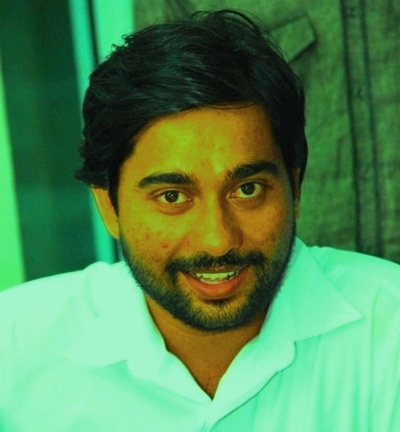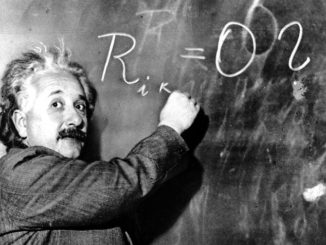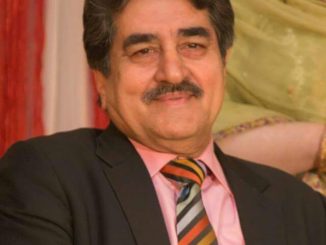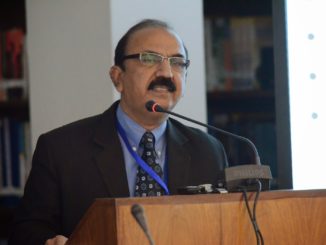
A gleaming candle in the darkness of time : a homage to Rahi Masoom Raza
by Abu Osama
Assistant Professor
Department of Social Work
Maulana Azad National Urdu University
Hyderabad, India
In a letter to Kamleshwar, once Rahi Masoom Raza had sought a reply from him asking that, “Yaar Kamleshwar ye mausam badal kyo nahii raha hai!” This impression seems true for present situations. When the echo of slogans chanted against Muslims at the time of partition, long erased from the public memory have not only been resurrected but has become more emboldened and shrill, the dehumanization of Muslim community has touched a new low; one cannot but be reminded of the trauma and collective sufferings during the partition. To be a silent witness and keeping oneself aloof can be criminal. Perhaps, we are living through one of the most difficult times in the history of our nation, with very little gleam of hope in such dark times. In this extreme depressing and disappointing time one is compelled to remember one of the finest contemporary writers and a master narrator- Rahi Masoom Raza.
Rahi wrote the mesmerizing dialogues of famously screened serial, Mahabharata. He was criticized by many for his radical and unorthodox thinking and writings. He was never satisfied with the behaviour of his fellow writers. His contemporaries envied his art of narration and ideological framework for Hindu-Muslim relations but never accepted and allowed him to enter into Urdu fraternity.
Rahi was deeply saddened by the hypocrisy of public and private spheres of life during his time. He has questioned the very idea of identity purification in such a diverse country like us, social realities and psyche of the nation through many of his remarkable fictitious works. His novels are plotted with such beauty that one perceives them as deadly non-fictions.
The pertinent questions which he raised decades ago still haunt us in the present, as many of the questions he asked remain unanswered. The perfect tribute to his rich legacy will be upholding and standing true to the vision of society he had. His soul will only rest in peace, till we are able to walk the path he had shown to us and achieve what he wanted from all of us.
His extraordinary conviction to the humane ideas, i.e., to remain human in inhuman conditions and stay together despite all socio-cultural and religious diversities, stood completely apart from the times he lived in. He dreamt of a society which ensures every individual a life of dignity and where social justice shines supreme.
Born in Gangauli village of Ghazipur district at eastern line of Uttar Pradesh, he was educated at Aligarh Muslim University and moved (on account of unlike minded colleagues) to Mumbai in pursuit of a better career option. He wrote some of the best novels of his time. He has deliberated upon socio-political realities of everyday and presented a historical narrative of “chosen trauma” and “chosen glory” in books such as Oas ki boond, Neem ka Ped, Katra bee Aarzoo, etc.
He equally believed in inward and outward critique. While he did not shirk away from in inviting self-critique when he asked Muslims to be inward looking in considering the sectarian divide within the Muslim community, which had created deep divides and unrest within. He was equally scathing in his attack on the non-Muslims for being indifferent to the precarious socio-economic conditions of the Muslim community in India.
He was in the view that the pitiable plight of Muslims and their alienation from the mainstream is largely due to unattended social and economic needs by their fellow countrymen.
Rahi saheb primarily focuses on everydayness, about common history and shared legacy of people living to this corner of the planet. He also proposed how and why we have come to this level of wide rift between the two communities. This is the idea which Levi Strauss presents when he argues ‘about cultural dialogues of different communities that, each culture, by definition, is incomplete but the very incompletion of cultures makes humanity complete.’
One of his celebrated novels is Aadha Gaaon. The story deals with the life at Gangauli. Its characters are villagers yet at the same time it is a masterpiece literary work on the partition of India. The novel is a social and cultural account of an undivided nation. In the midst of the novel characters find a sudden changed context around them. Through the novel one visualises pain and cries of families whose relatives have moved to Pakistan in search of security and suitable careers.
It seemed that partition of India was the final destiny of Indian Muslims. So the case is here: while a few moved to Pakistan, more chose to stay back in India. Both the Muhajirs and Indian Muslims paid a heavy price in return. The traumatic experiences of partition had astounding impacts on all of us. Can we afford one more human displacement? Certainly not! For Funnan Mia, Pakistan was a nightmare but the only place which he wants to be buried is none other than Gangauli.
The tragedy with Topi Shukla is that he was neither accepted by his ‘community’ nor by ‘others’ which resulted into his suicide at one juncture of his life. Responding to the plight of Topi Shukla, Rahi saheb conveyed a fundamental belief in the idea of human life and that suicide is a blot on the forehead of any nation or civilization. Wazir Hasan was killed by Hindus while protecting a temple to be demolished. How many of us dare to play such roles in our daily social engagements? Perhaps such people can be counted on fingers. The people like Wazir Hasan needs to be kept alive in public memory. The rediscovery of Wazir Hasan is a compelling need of the dark times we are living in.
In Topi Shukla, one of his most compelling commentaries of contemporary times, he narrates about communal clash and subsequent bloodshed stretched over many neighbouring villages. All over the place there dead bodies could be seen; for him these bodies were dead bodies of Indians. In this form these bodies were beyond the categorization of Hindus and Muslims.
In other words he meant that these dead bodies symbolized death of humanity, secularism and tolerance. Riots are bi-products of the brazen conspiracy of rogue politicians. And are we all blissfully unaware of the relations between communal clash and election notification?
The irony is complete. The communal division of the country, from the times of partition seem to be approaching full circle. While the Muhajirs on the other side of the border present day Pakistan, are least welcome. What we are witnessing on this side of the border is that desperate hurries to send off the remaining Muslims to that side and meet the fate of their Muhajir fellows. Someone from us must remind ourselves of Rahi Masoom Raza in such dark times.
The iron confidence with which he said no to Jan Sangh, is worth mentioning here. But the Indian Muslims are fast losing that small space of asserting their voices and their rights to be equal citizens in the present day India. The present ruling regime is not only committed to expel Muslims from their own land, but wants a history re-written without them.
Dehumanization does not require official consent; it gradually creeps in with an unofficial manner but accepted widely as a universal truth after one point of time. He was fortunate enough to put critique on social situations sitting somewhere in the corner of his home and could say that with conviction till he breathed his last.
But the present regime, riding upon false consensus and shoddy discourse this regime does not even allow a note of dissent. Any act of resistance is discouraged. Martin Luther King would have observed it as ‘a long night of captivity’. The progressive voices from such literature have lost their sheens, their presence does not get the needed attention.
We are left at the mercy of political establishment. Each sphere of life is occupied by them, journalism has become a futile exercise of sensational news notifications; TV debates shout out for TRPs; social media is destined to be the dustbin of boredom.
The art of articulation through fiction has been overruled. Rahi saheb is an abandoned idea in the age of Chetan Bhagat. As a result we have become utter hostile for any kind of dissenting muse.
The pedagogy which Rahi saheb had offered to the society has been rejected outrightly by us, as a nation. We are collectively responsible for the end result of an unjust society which does not even bother to understand its cultural heritage and a common history of thousand years. His deep understanding of cultural diversity and majority-minority relationship has lost its place. With this we have also lost Funnan Mia, Topi Shukla and Wazir Hasan who had enlivened our old idea of India.
They are the true exemplars of Indian-ness. Beyond political rhetoric and hypocrisy, they present a face of humanity and tolerance immersed in their soil and homeland. Aren’t we shying away from such collective vocabularies and losing sight of and command over the tales of extraordinary courage, so beautifully brought to life by the late Rahi saheb.
In the context of the dark times we are going through, one should not forget to remember Rahi saheb’s staunch assertion:
“The Jan Sangh says that Muslims are outsiders. How can I presume they’re lying? But I must say that I belong to Ghazipur. My bonds with Gangauli are unbreakable. It’s not just a village, it’s my home. Home!! This word exists in every language and dialect in this world, and is the most beautiful word in every language and dialect. And that is why I repeat my statement- because Gangauli’s not just a village; it’s my home as well. ‘Because’ – what a strong word this is. And there are thousands of ‘becauses’ like it and no sword is sharp enough to cut this ‘because’. And as long as this ‘because’ is alive, I will remain Saiyid Masoom Reza Abidi of Ghazipur, wherever my grandfather hailed from. And I give no one the right to say to me, ‘Rahi! You don’t belong to Gangauli, and so get out and go, say, to Rae Bareli.’ Why should I go, Sahib? I will not go.”
The Indians of all hue today need to reaffirm this proclamation of Rahi saheb, India is not merely a piece of land, it is home to a large number of Muslims. They will not go anywhere, but will lead a life of dignity and respect in this very country, because it is their home.
The writer is academically engaged on themes such as marginalization, minority-majority relationships, culture and indigenous knowledge.




